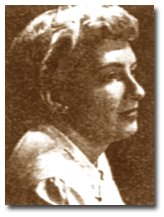1923 – 1971
Created the widely-emulated model of preventive casework
Although Lydia Rapoport’s life was a relatively short one, she was able to make profound contributions to the practice and teaching of social work that reached around the world. Her most renowned contribution was as the leader in the field of short-term, preventive social casework based on a model that strongly emphasized the social components of mental well-being. This health-oriented approach was a break from the traditional, psychoanalytically one and informed her international consultation and teaching throughout her distinguished career.
Rapoport came to the U.S. as a child from Vienna and grew up in New York. She was a brilliant student, and was the youngest ever to graduate from Smith College School for Social Work (1944) with her Master’s degree at age 21. She then completed three years of postgraduate training at the Chicago Institute for Psychoanalysis. In 1952, she won a Fullbright Fellowship and studied at the London School of Economics. She came to California in 1954 as a member of the faculty of the School of Social Welfare at the University of California, Berkeley where she remained until her death. She became a full professor in 1969, a rare achievement for a woman during that era.
At Berkeley she served as the director of psychiatric social work education and was the supervisor of the California State Mental Health Clinic for UC Berkeley students. During her years of teaching, she conducted major research and was a prolific writer. She worked on central concepts of personality stress and learning theories in her work on the preventive model of casework. She was also in the forefront of formulating a theoretical basis for defining consultation and supervision as distinct social work functions. She defined and delineated the role of the social worker as a consultant and supervisor in education and in social work practice.
In 1963, she became a visiting professor at Hebrew University’s Baerwald School of Social Work and helped to develop an undergraduate curriculum. In January of 1971, she was appointed as the first United Nations Inter-Regional Advisor on Family Welfare and Family Planning, but she became ill and died suddenly in September.
Lydia Rapoport’s contributions were recognized not only in California, but also throughout the United States and the world. To commemorate her many accomplishments and further her work, a publication “Creativity in Social Work: Selected Writings of Lydia Rapoport” continues to promote her innovative ideas and vision for social work for future generations.
